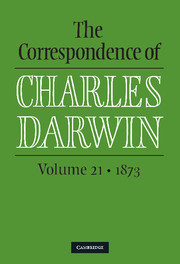Book contents
- Frontmatter
- Dedication
- Contents
- List of illustrations
- List of letters
- Introduction
- Acknowledgments
- List of provenances
- Note on editorial policy
- Darwin/Wedgwood genealogy
- Abbreviations and symbols
- THE CORRESPONDENCE January 1873
- THE CORRESPONDENCE February 1873
- THE CORRESPONDENCE March 1873
- THE CORRESPONDENCE April 1873
- THE CORRESPONDENCE May 1873
- THE CORRESPONDENCE June 1873
- THE CORRESPONDENCE July 1874
- THE CORRESPONDENCE August 1873
- THE CORRESPONDENCE September 1873
- THE CORRESPONDENCE October 1873
- THE CORRESPONDENCE November 1873
- THE CORRESPONDENCE December 1873
- Appendixes
- Manuscript alterations and comments
- Biographical register and index to correspondents
- Bibliography
- Notes on manuscript sources
- Index
Introduction
Published online by Cambridge University Press: 05 July 2018
- Frontmatter
- Dedication
- Contents
- List of illustrations
- List of letters
- Introduction
- Acknowledgments
- List of provenances
- Note on editorial policy
- Darwin/Wedgwood genealogy
- Abbreviations and symbols
- THE CORRESPONDENCE January 1873
- THE CORRESPONDENCE February 1873
- THE CORRESPONDENCE March 1873
- THE CORRESPONDENCE April 1873
- THE CORRESPONDENCE May 1873
- THE CORRESPONDENCE June 1873
- THE CORRESPONDENCE July 1874
- THE CORRESPONDENCE August 1873
- THE CORRESPONDENCE September 1873
- THE CORRESPONDENCE October 1873
- THE CORRESPONDENCE November 1873
- THE CORRESPONDENCE December 1873
- Appendixes
- Manuscript alterations and comments
- Biographical register and index to correspondents
- Bibliography
- Notes on manuscript sources
- Index
Summary
Having laboured for nearly five years on human evolution, sexual selection, and the expression of emotions, Darwin was able to devote 1873 almost exclusively to his beloved plants. He resumed work on the digestive powers of sundews and Venus fly traps, and the comparative fertility and vigour of self- and cross-pollinated species, work that would culminate in two books, Insectivorous plants (1875) and Cross and self fertilisation (1876). Darwin's son Francis became increasingly involved in this botanical research, eventually renouncing plans for a medical career to become his father's scientiic secretary. Darwin had always relied on assistance from within the family, and he was clearly delighted by Francis's decision. A large portion of the letters Darwin received in i873 were in response to The expression of the emotions in man and animals, published the previous year. As was typical, readers wrote to Darwin personally to offer suggestions, observations, and occasional criticisms, some of which were incorporated in a later edition. Darwin also contributed to discussions in the scientific weekly Nature on the role of inherited and acquired characteristics in animals. The subject was brought closer to home by Francis Galton's work on inherited talent, which prompted Darwin to reflect on the traits and conditions that had led to his achievement in science.
- Type
- Chapter
- Information
- The Correspondence of Charles Darwin , pp. xv - xxivPublisher: Cambridge University PressPrint publication year: 2014



